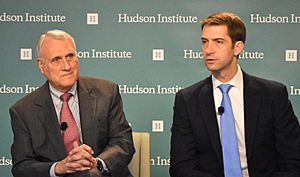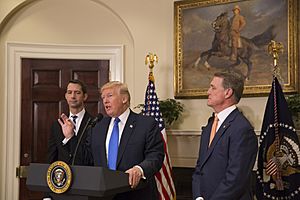Tom Cotton facts for kids
Quick facts for kids
Tom Cotton
|
|
|---|---|
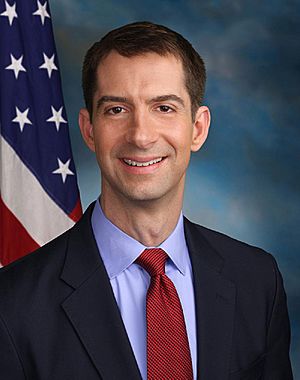
Official portrait, 2015
|
|
| Chair of the Senate Republican Conference | |
| Assumed office January 3, 2025 |
|
| Leader | John Thune |
| Preceded by | John Barrasso |
| Chair of the Senate Intelligence Committee | |
| Assumed office January 3, 2025 |
|
| Preceded by | Mark Warner |
| United States Senator from Arkansas |
|
| Assumed office January 3, 2015 Serving with John Boozman
|
|
| Preceded by | Mark Pryor |
| Member of the U.S. House of Representatives from Arkansas's 4th district |
|
| In office January 3, 2013 – January 3, 2015 |
|
| Preceded by | Mike Ross |
| Succeeded by | Bruce Westerman |
| Personal details | |
| Born |
Thomas Bryant Cotton
May 13, 1977 Dardanelle, Arkansas, U.S. |
| Political party | Republican |
| Spouse |
Anna Peckham
(m. 2014) |
| Children | 2 |
| Education | Harvard University (BA, JD) |
| Website | |
| Military service | |
| Allegiance | |
| Branch/service | |
| Years of service |
|
| Rank | Captain |
| Unit |
|
| Battles/wars | |
| Awards |
|
Thomas Bryant Cotton (born May 13, 1977) is an American politician and former Army officer. Since 2015, he has served as a U.S. Senator for Arkansas. He is a member of the Republican Party. As of 2025, he is the chairman of the Senate Republican Conference and also leads the Senate Intelligence Committee.
Before becoming a senator, Cotton was a member of the United States House of Representatives from 2013 to 2015. He represented Arkansas's 4th congressional district. He won his Senate seat in 2014, defeating the Democratic senator Mark Pryor. Cotton is known for his conservative views and his strong opinions on foreign policy, especially concerning countries like China and Iran.
Contents
Early Life and Education
Thomas Bryant Cotton was born on May 13, 1977, in Dardanelle, Arkansas. His father worked for the Arkansas Department of Health, and his mother was a schoolteacher and later a middle school principal. Cotton grew up on his family's cattle farm in rural Arkansas. His family had lived in the area for many generations.
He went to Dardanelle High School, where he played basketball. He was tall, standing 6 feet 5 inches, and usually played as a center.
After high school, Cotton was accepted into Harvard College in 1995. He studied government and wrote for The Harvard Crimson, the student newspaper. He graduated in 1998 with high honors after only three years. His main project focused on The Federalist Papers, which are important writings about the U.S. Constitution.
After Harvard College, Cotton started a master's program but left in 1999. He then went to Harvard Law School, where he earned his law degree in 2002.
Career Before Politics
After law school, Cotton worked as a law clerk for a judge. He then worked as a lawyer at private firms in Washington, D.C.. In 2005, he decided to join the U.S. Army.
Military Service
Cotton joined the United States Army on January 11, 2005. He became an officer in June 2005. He completed tough training programs like Ranger School and United States Army Airborne School. These programs taught him leadership and combat skills.
In May 2006, Cotton was sent to Baghdad, Iraq, as part of Operation Iraqi Freedom. He led an infantry platoon in the 101st Airborne Division. His team performed daily patrols. In December 2006, he was promoted and moved to the 3rd U.S. Infantry Regiment.
From October 2008 to July 2009, Cotton served in eastern Afghanistan. He helped plan operations for a team that worked on both combat and rebuilding efforts.
Cotton left active duty in September 2009. He completed two combat tours overseas. He received several awards, including the Bronze Star Medal and two Army Commendation Medals. After his active service, he worked for a management consulting firm.
In July 2010, Cotton joined the United States Army Reserve. He served there until May 2013.
Army Ranger Discussion
There has been some discussion about Cotton's use of the term "Ranger." He graduated from Ranger School and earned the "Ranger Tab," which means he completed the demanding training. However, he did not serve in the 75th Ranger Regiment, which is a specific special operations unit.
Some people, including other veterans, have different opinions on whether someone who completed Ranger School but not the 75th Ranger Regiment should call themselves a "Ranger." Cotton has stated that he graduated from Ranger School and wore the Ranger tab in combat. He believes the discussion is mostly about politics.
U.S. House of Representatives
After his service in Afghanistan, Cotton considered running for office. In 2011, he decided to run for Congress in Arkansas' 4th congressional district. The current Democratic representative was not seeking reelection.
Elections
2012 Election
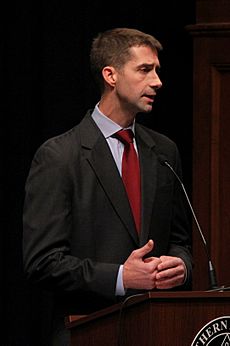
In the Republican primary election in May 2012, Cotton won with 57.6% of the votes. He received support from conservative groups and Senator John McCain.
In the general election on November 6, Cotton defeated state senator Gene Jeffress. He won with 59.5% of the vote. He became the second Republican to represent the 4th district since the Reconstruction Era of the United States. Cotton was sworn into the House of Representatives on January 3, 2013.
Time in the House
As a new member of Congress, Cotton often spoke out against the policies of the Obama administration. He voted against a pay increase for federal employees in 2013. He also voted against the 2013 and 2014 Farm Bills, which deal with agriculture and food programs.
Cotton was critical of the nuclear agreement with Iran. He believed the president was making it seem like the only choice was between the agreement and a large war. He suggested that military action against Iran might not be as difficult as some thought.
U.S. Senate
Elections
2014 Election
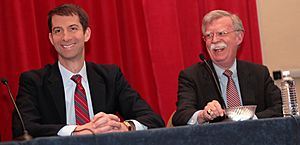
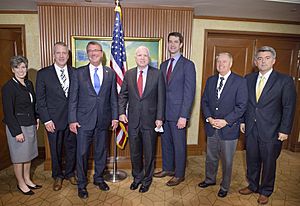
On August 6, 2013, Cotton announced he would run for a seat in the United States Senate. He challenged the Democratic senator Mark Pryor. Many experts believed Pryor was vulnerable in the election. Cotton received support from various conservative groups and politicians, including former presidential candidate Mitt Romney.
Cotton won the election on November 4, 2014, with 56.5% of the votes. He was sworn into office on January 6, 2015.
2020 Election
Cotton was reelected in 2020. He defeated Libertarian candidate Ricky Dale Harrington Jr. Cotton received 66.53% of the vote.
Time in the Senate
First Trump Administration
During President Donald Trump's time in office, Cotton was seen as a strong supporter. He often met with Trump's team. Some people close to Trump said Cotton understood the idea of "economic nationalism" very well.
In 2016, Cotton discussed the use of certain interrogation methods. He said that if intelligence officials believed a terrorist had important information, it would be a "tough call" to decide how to get it.
In September 2020, Trump considered Cotton as a possible nominee for the Supreme Court. However, Trump ultimately chose Amy Coney Barrett. Cotton supported a quick Senate vote on Trump's nominee after Justice Ruth Bader Ginsburg passed away.
In January 2021, Cotton stated he would not support efforts to overturn the 2020 presidential election results.
Second Trump Administration
In November 2024, Cotton was chosen to lead the Senate Republican Conference. He also became the chairman of the Senate Intelligence Committee. He was also considered for the role of United States Secretary of Defense in the new Trump administration.
Senate Committee Assignments

Cotton serves on several important committees in the Senate:
- Committee on Armed Services
- Select Committee on Intelligence (Chair)
- Joint Economic Committee
- Committee on Energy and Natural Resources
Political Views
Cotton is known for his conservative political views.
Race Relations
Cotton has expressed strong opinions on race relations. He has said that race relations would improve if less emphasis was placed on race in public life.
In 2016, Cotton argued that the U.S. has an "under-incarceration problem," meaning not enough criminals are jailed. He said that reducing sentences for felons could make the country less stable.
During the George Floyd protests in 2020, Cotton suggested using the military to support police. He used the phrase "no quarter for insurrectionists," which means showing no mercy. He later clarified he was using the phrase in a general way.
The New York Times published an opinion piece by Cotton titled "Send in the Troops." In the article, he argued for sending federal troops to cities to stop looting and rioting. This article caused a lot of discussion and criticism among the newspaper's staff.
Statements About Slavery
In July 2020, Cotton introduced a bill called the Saving American History Act of 2020. This bill aimed to prevent federal money from being used to teach about The 1619 Project, which is an initiative by The New York Times about the history of slavery in America.
In an interview, Cotton said that the Founding Fathers viewed slavery as a "necessary evil" when the country was built. Historians have debated this statement, with some saying it is not fully accurate. Cotton later clarified that he was not supporting slavery but explaining what he believed were the views of the Founders.
Gun Laws
Cotton has a strong record of supporting gun rights. He has an "A" rating from the National Rifle Association of America (NRA), a major gun rights group.
In 2019, he supported a bill that would allow people with concealed carry permits in their home state to carry their weapons in other states that also have concealed carry laws. In 2017, he said he was open to discussing regulations on "bump stocks," which are devices that make semi-automatic rifles fire faster.
Immigration
Cotton has a firm stance against illegal immigration. In 2012, his campaign website stated that he did not support granting "amnesty" or a "path to citizenship" for undocumented immigrants.
In 2017, Cotton and Senator David Perdue proposed a new immigration bill called the RAISE Act. This bill aimed to limit family-based immigration and reduce the number of refugees allowed into the U.S. It also sought to end the Diversity Immigrant Visa program.
Cotton supported President Trump's 2017 order that temporarily banned immigration from several Muslim-majority countries.
Health and Social Issues
Cotton opposed the Affordable Care Act, also known as Obamacare. He called for its repeal, saying it was "offensive to a free society."
In 2019, Cotton called the Southern Poverty Law Center, a civil rights organization, a "political hate group." He asked the IRS to review its tax-exempt status.
Cotton supports the traditional definition of marriage as between one man and one woman. He also voted against reauthorizing the Violence Against Women Act in 2013, citing concerns about federal powers in the act.
Student Loans
In 2013, Cotton voted against a bill that would set interest rates on student loans. He preferred a solution that would end what he called the "federal-government monopoly on the student-lending business."
January 6, 2021
On January 6, 2021, when the U.S. Capitol was attacked, Cotton released a statement condemning the actions. He called those involved "insurrectionists" and said they should face the full force of federal law. He later voted against creating an independent commission to investigate the attack.
Foreign Policy Views
Cotton is known for his strong and sometimes aggressive foreign policy views. He is often described as a "war hawk."
In 2015, he suggested that more prisoners should be kept at Guantanamo Bay detention camp instead of closing it.
China
Cotton has been very vocal about his views on China. In 2018, he supported a bill to examine China's attempts to influence the U.S. and its allies. He also urged the Trump administration to sanction Chinese officials for human rights violations against the Uyghurs in Xinjiang.
In 2019, Cotton suggested that the U.S. should buy Greenland. He also supports the U.S. leaving the Treaty on Open Skies, which allows countries to monitor each other's military activities.
In April 2020, Cotton said that Chinese students in the U.S. should be limited to studying humanities and not science-related fields. He believed it was wrong to train "the Chinese Communist Party's brightest minds." In August 2020, the Chinese government placed sanctions on Cotton and other Americans for their comments on Hong Kong.
In 2021, Cotton released a report called "Beat China: Targeted Decoupling and the Economic Long War." This report called for the U.S. to reduce most economic ties with China. He said the U.S. needed to "beat this evil empire."
In 2023, Cotton and Senator Katie Britt introduced a bill to ban Chinese nationals or entities from owning American land. They reintroduced this bill in January 2025.
COVID-19
In January 2020, as COVID-19 emerged, Cotton urged the Trump administration to stop commercial flights from China to the U.S. This travel ban was put in place on January 31.
In February 2020, Cotton suggested that the coronavirus might have started at a high-security lab in Wuhan, China. He said that because of China's dishonesty, the question needed to be asked. While scientists initially dismissed this idea, some later assessments, including one by the United States Department of Energy in early 2023, suggested a "lab leak" was possible. Cotton responded by saying that holding China accountable was what mattered most.
Israeli–Palestinian Conflict
Cotton has shown strong support for Israel. In 2017, he co-sponsored a bill to prohibit support for foreign boycotts of Israel.
In October 2023, Cotton condemned Hamas's actions during the Gaza war and supported Israel's right to defend itself. He stated that if Hamas used schools or mosques for military purposes, Israel had the right to strike them. He also said that anything that happens in Gaza is Hamas's responsibility.
In April 2024, Cotton threatened to cut U.S. funding to the International Criminal Court (ICC) if it issued arrest warrants for Israeli officials. After the ICC did issue warrants in November 2024, Cotton called the court a "kangaroo court" and suggested that The Hague, where the ICC is located, should be invaded if Israeli officials were arrested.
Iran
In March 2015, Cotton wrote a letter to the leaders of Iran, signed by 47 Republican senators. The letter questioned the Obama administration's authority to make a nuclear agreement with Iran. It stated that the next president could easily reject the agreement. This letter caused a lot of controversy, with some critics saying it undermined the president's efforts.
Cotton defended the letter, saying it was important to send a clear message to Iran. He has received financial support from groups that oppose the Iran nuclear deal.
In July 2018, Cotton introduced a bill to sanction Iranians responsible for the imprisonment of Americans. He warned Americans to avoid Iran. In May 2019, Cotton said that if there was a war with Iran, the U.S. could win easily in "two strikes."
Personal Life
Cotton married attorney Anna Peckham in 2014. They have two children.
In 2019, Cotton published a book about the Old Guard at Arlington National Cemetery, based on his time serving in that unit.
Electoral History
| Year | Office | Party | Primary | General | Result | Swing | |||||||
|---|---|---|---|---|---|---|---|---|---|---|---|---|---|
| Total | % | P. | Total | % | ±% | P. | |||||||
| 2012 | U.S. Representative | Republican | 20,899 | 57.55% | 1st | 154,149 | 59.53% | +19.38% | 1st | Won | Gain | ||
| 2014 | U.S. Senator | Republican | 478,819 | 56.50% | N/A | 1st | Won | Gain | |||||
| 2020 | Republican | 793,871 | 66.53% | +10.03% | 1st | Won | Hold | ||||||
Military Awards
Cotton's military awards and decorations include:
 101st Airborne Division Combat Service ID Badge 101st Airborne Division Combat Service ID Badge |
 506th Infantry Regimental Distinctive Insignia 506th Infantry Regimental Distinctive Insignia |
| Army Commendation Medal (with Oak leaf cluster) |
| Afghanistan Campaign Medal (with two campaign stars) |
| Iraq Campaign Medal (with campaign star) |
See also
 In Spanish: Tom Cotton para niños
In Spanish: Tom Cotton para niños
- List of members of the American Legion
- Donald Trump Supreme Court candidates
 | Leon Lynch |
 | Milton P. Webster |
 | Ferdinand Smith |



